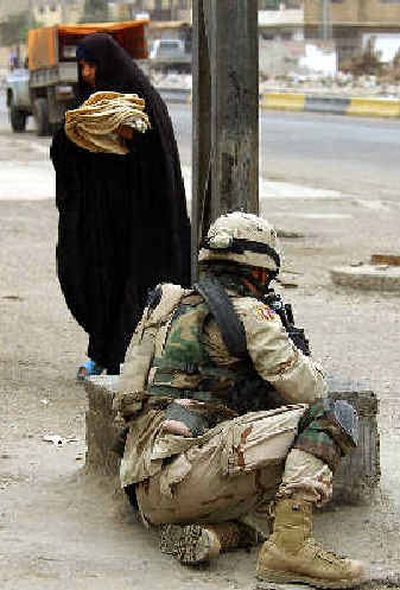Troops make gains in Fallujah, Mosul

BAGHDAD, Iraq – A suicide car bomber blasted an American convoy north of Baghdad and U.S. troops battled insurgents west of the capital Wednesday as a wave of violence across Iraq’s Sunni Muslim heartland killed at least 27 people.
American forces pursued their search-and-destroy mission against the remaining holdouts in the former insurgent bastion of Fallujah, and to the north, American forces pressed an offensive to reclaim part of the city of Mosul from militants.
November became one of Iraq’s bloodiest months as the U.S. death toll in the war in Iraq reached 1,214, according to figures released by the Defense Department.
On Wednesday, a suicide attacker drove his bomb-laden car into a U.S. convoy during fierce fighting in the town of Beiji, 155 miles north of Baghdad, killing 10 people and wounding 12, including three American soldiers. Another attack on a convoy of civilian contractors in Beiji caused no casualties.
Elsewhere, a three-hour gunbattle between militants and U.S. forces after nightfall left seven people dead and 13 hurt in Ramadi, a city west of Fallujah.
Insurgents fired rocket-propelled grenades, mortar and Kalashnikov rifles at American forces in the city center, Zayout district and along the main highway in town, said Abdel Karim al-Hiti of Ramadi General Hospital.
Ramadi, about 70 miles west of Baghdad, falls within the restive Sunni Triangle area north and west of the capital where the bulk of insurgent attacks have erupted.
Although fighting has ebbed in Fallujah, it has not ceased. The U.S. military said pockets of insurgents remain even though the city is fully occupied by American troops.
On Wednesday, heavy machine-gun fire and explosions rang out in south-central parts of the city as U.S. Marines hunted remaining fighters. In the northern Jolan neighborhood, Marines killed seven insurgents who officers said had sneaked back into the city by swimming the Euphrates River.
Bullets snapped overhead, and Iraqis collecting bodies of the dead ran for cover behind walls and in buildings as Marines returned fire. After 15 minutes of fighting, three insurgents were dead and one Marine was slightly injured in the hand, officers said.
Reports surfaced that 31 policemen had been kidnapped in the town of Rutba near the Jordanian border by armed men who stormed a hotel where the officers were staying.
The Karbala police officer who made the report said he escaped a raid Sunday by armed men in the hotel, according to a police spokesman.
The officer said about 20 men attacked the hotel, covering the captives’ heads with black bags and tying their hands before dragging them away, the spokesman said. The officer said he was beaten but was not abducted.
Adnan Asadi, deputy interior minister for administrative affairs, said the abduction reports were “not true.” He said the police sent for training in Jordan had not returned.
In Mosul, where insurgents launched an uprising last week, the situation appeared calmer with U.S. and Iraqi troops encountering isolated small-arms attacks, the military said.
A U.S.-led operation that began Tuesday was aimed at regaining full control of the city, where gunmen stormed police stations, bridges and political offices last week. The city’s police force had been overwhelmed and in many places failed to put up a fight. Some officers allegedly cooperated with insurgents.
Brig. Gen. Carter Ham, U.S. commander in Mosul, told CNN the offensive, which involved up to 2,500 U.S. and Iraqi forces, was aiming to “disrupt (insurgents), keep them from getting organized wherever they may be, try to keep them from accomplishing their goal.”
The operation swept through the western part of Mosul, Iraq’s third-largest city, and secured about a dozen police stations.